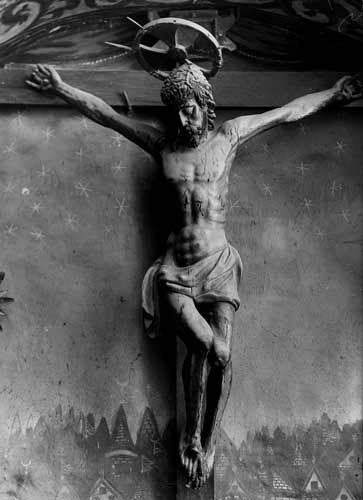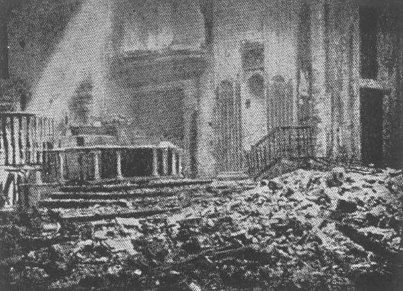ANTHONY VALLE: Your Excellency, you have been generous in giving several interviews to the international press regarding liturgy since becoming the secretary of the Congregation for Divine Worship. Some of your statements have been misinterpreted and aroused controversy rather than providing the intended clarity. Would you care to clarify anything?
ARCHBISHOP MALCOM RANJITH: What I wished to insist on in those interviews was that the post-conciliar reform of the liturgy has not been able to achieve the expected goals of spiritual and missionary renewal in the Church so that today we could be truly happy about it.
Undoubtedly there have been positive results too; but the negative effects seem to have been greater, causing much disorientation in our ranks.
The churches have become empty, liturgical free-wheeling has become the order of the day, and the true meaning and significance of that which is celebrated has been obscured.
One has to, then, begin wondering if the reform process had in fact been handled correctly. Thus, we need to take a good look at what had happened, pray and reflect about its causes and with the help of the Lord move on to make the necessary corrections.
VALLE: It seems as if Pope Benedict XVI will release a motu proprio to liberalize the use of the traditional or Tridentine Mass. Some hope that the Pope’s motu proprio will institute a juridical structure enabling priests to celebrate the traditional Mass without being unjustly harassed and persistently thwarted by, ironically, not people of other faiths or secular authorities, but by their own pastors and bishops. Is this hope for a new juridical apparatus realistic? Is such an apparatus necessary?
RANJITH: Well, there is this rising call for a restoration of the Tridentine Mass. And even certain leading figures of the elite have made public appeals for this Mass in some newspapers recently.
The Holy Father will, I am sure, take note of this and decide what is best for the Church.
You speak of the possible realization of new juridical structures for the implementation of such decisions. I do not think that this would be so much of a problem. Rather what is more important in all of this is a pastoral attitude.
Will the bishops and priests reject requests for the Tridentine Mass and so create a need for juridical structures to ensure the enforcement of a decision of the Pope? Should it go that way?
I sincerely do not hope so.
The appropriate question the shepherds have to ask themselves is: How can I as a bishop or priest bring even one person closer to Christ and to His Church?
It is not so much a matter of the Tridentine Mass or of the Novus Ordo. It is just a question of pastoral responsibility and sensitivity.
Thus, if the Tridentine Mass is the way to achieve an even better level of spiritual enrichment for the faithful, then the shepherds should allow it.
The important concern is not so much the "what" as much as the "how." The Church should always seek to help our faithful to come closer to the Lord, to feel challenged by His message and to respond to His call generously. And if that can be achieved through the celebration of the Novus Ordo Mass or the Pius V Mass, well, then space should be provided for whatever is best instead of getting down to unnecessary and divisive theological hair-splitting. Such things need to be decided through the heart and not so much through the head.
After all, Pope John Paul II did make a personal appeal in Ecclesia Dei Adflicta of 1988 to the bishops, calling upon them to be generous in this matter with those who wish to celebrate or participate in the Tridentine Mass. Besides, we should remember that the Tridentine Mass is not something that belongs to the followers of Archbishop Lefebvre only. It is part of our own heritage as members of the Catholic Church.
The Second Vatican Council, as Pope Benedict so clearly stated in his speech to the members of the Curia in December 2005, did not envisage a totally new beginning, but one of continuity with a renewed sense of enthusiasm and a new outlook that better responds to the missionary needs of the time.
Besides, we also have the serious question of the diminishing number of faithful in some of the churches in the Western world. We have to ask ourselves what happened in these churches and then take corrective steps as may be necessary. I do not think that this situation is attributable to secularization only. A deep crisis of faith coupled with a drive for meaningless liturgical experimentation and novelty have had their own impact in this matter. There is much formalism and insipidity visible at times.
Thus, we need to recover a true sense of the sacred and mystical in worship.
And if the faithful feel that the Tridentine Mass offers them that sense of the sacred and mystical more than anything else, then we should have the courage to accept their request.
With regard to the timing and nature of the motu proprio, nothing yet is known. It is the Holy Father who will decide.
And when he does, we should in all obedience accept what he indicates to us and with a genuine love for the Church strive to help him. Any counter attitude would only harm the spiritual mission of the Church and thwart the Lord’s own will.
VALLE: Like many Catholics today, my wife and I have found that we leave the celebration of the Novus Ordo Mass on Sunday exasperated and perplexed rather than spiritually invigorated. Why?
RANJITH: In the celebration of the Novus Ordo we have to be very serious about what we do on the altar. I cannot be a priest who dreams in his sleep about what I will do at the Mass the following day, walk up to the altar and start celebrating with all kinds of novel self-created rubrics and actions.
The Holy Eucharist belongs to the Church. Hence, it has a meaning of its own which cannot be left to the idiosyncrasies of the single celebrant.
Every element in the liturgy of the Church has its own long history of development and significance. It is certainly not a matter of private "traditions" and so cannot be the object of manipulation by all and sundry.
In fact, Sacrosanctum Concilium does state that other than the Apostolic See and the bishops, where this is allowed to the latter by the former, "absolutely no other person, not even a priest, may add or remove or change anything on his own authority" (SC 22). Even then, we note much free-wheeling in liturgical matters in some areas of the Church today, basically due to an incorrect understanding of liturgical theology.
For example, the mystery of the Holy Eucharist has often been misunderstood or partially understood, leaving thus the door open to all kinds of liturgical abuses.
In the celebration of the Holy Eucharist, some place too much accent on the presidential role of the priest. But we know that the priest is really not the main agent of what happens on the altar.
It is Jesus Himself.
Besides, every liturgical celebration has also a heavenly dimension "which is celebrated in the holy city of Jerusalem towards which we journey as pilgrims" (SC 8).
Others explain the Eucharist in a way that places the accent on its banquet/meal dimension, linking it to "communion." This too is an important consideration, but we should remember that it is not so much a communion created by those taking part in the Eucharist as much as by the Lord Himself.
Through the Eucharist, the Lord assumes us unto Himself and in Him we are placed in communion with all the others who unite themselves to Him. It is thus not so much a sociological experience as much as a mystical one. Hence even as "communion" the Eucharist is a heavenly experience.
What is more important is the sacrificial dimension of the Eucharist. Each time we celebrate the Eucharist we relive the sacrifice of Calvary, celebrating it as the moment of our salvation.
And this very fact also constitutes the unique dignity and font of identity of the priest. He has been instituted by Christ to celebrate the wonderful mystery of turning this corruptible piece of bread into the very glorified Body of Christ and this little bit of wine into the Blood of Christ, enacting the sacrifice of Calvary for the salvation of the world. And this has to be lived, understood and believed by the priest each time he celebrates the Eucharist.
Indeed, Sacrosanctum Concilium placed accent on the sacrificial and salvific effectivity of the Mass. The priest thus becomes another Christ, so to say. What a great vocation! And so, if we celebrate the Eucharist devoutly, then the faithful will reap immense spiritual benefit and return again and again in search of that heavenly nourishment.
VALLE: Some have contended that the solution to the liturgical crisis -- and at bottom the crisis of faith -- afflicting the Catholic Church today would be to implement the exclusive use of the Tridentine Mass, while others maintain that all we really need is a "reform of the reform," in other words, a reform of the Novus Ordo. What do you think?
RANJITH: An "either-or" attitude would unnecessarily polarize the Church, whereas charity and pastoral concern should be the motivating factors.
If the Holy Father so desires, both could co-exist.
That would not mean that we would have to give up the Novus Ordo. But in the interaction of the two Roman traditions, it is possible that the one may influence the other eventually.
We can’t say everything is completed and finished, that nothing new could happen. In fact, Vatican II never advocated immediate change in the liturgy. Rather it preferred change to "grow organically from forms already existing" (SC 23). As Cardinal Antonelli, a much revered member of the Concilium that undertook the revision of the liturgy after the Council, noted in his diaries, some of the liturgical changes after the Council had been introduced without much reflection, haphazardly, and made later to become accepted practice.
For example, Communion in the hand had not been something that was first properly studied and reflected upon before its acceptance by the Holy See. It had been haphazardly introduced in some countries of Northern Europe and later become accepted practice, eventually spreading into many other places. Now that is a situation that should have been avoided. The Second Vatican Council never advocated such an approach to liturgical reform.
VALLE: Lex orandi, lex credendi, lex vivendi ("The law of praying (is) the law of believing, (is) the law of living"). Is it true that how we worship and pray influences what we believe, and that what we believe influences how we live? In other words, liturgy ultimately influences our moral life, does it not?
RANJITH: Yes. How can we convince the faithful to make sacrifices in their ethical and moral options, unless they are first touched and inspired by the grace of God profoundly? And such happens especially in worship when the human soul is made to experience the salvific grace of God most intimately. In worship, faith becomes interiorized and brims over with inspiration and strength, enabling one to take the moral options that are in consonance with that faith. In the liturgy, we should experience the closeness of God to our heart so intensely that we in turn begin to believe fervently and are compelled to act justly.
VALLE: What are some contemporary liturgical trends or problems that need correction?
RANJITH: One of these, as I see, is the trend to go for ecumenical liturgies in replacement of the Sunday Mass in some countries, during which Catholic lay leaders and Protestant ministers celebrate together and the latter are invited to preach the homily. Sunday Liturgies of the Word with the distribution of Holy Communion, which form is allowed in cases where a priest cannot be present, if turned into ecumenical events can give the faithful the wrong signal. They may get used to the idea of the Sunday without the Eucharist.
The Eucharist, as you know, makes the Church (Ed E. 21) and this is central to us Catholics. If it is so easily replaced by Liturgies of the Word, or worse still by so-called ecumenical prayer services, the very identity of the Catholic Church would be in question. Unfortunately, we hear also of cases whereby the Eucharist itself is being celebrated under various guises along with the Protestant pastors. This is totally unacceptable and constitutes a graviora delicta ("more grave offense") (RM 172).
Ecumenism is not something left to the ad hoc choice of individual priests. True ecumenism, such as the one espoused by Vatican II, comes from the heart of the Church. For example, the path to true ecumenism begins with serious reflection on the part of those who are deemed competent to engage in that type of reflection, such as the Pontifical Council for Christian Unity and the Holy Father himself. Not everyone has the competence to know in what way this delicate search for unity is to be perceived. It needs much reflection and prayer. Hence, liturgical novelty in the name of ecumenism should not be tried out individually.
A second disturbing trend is the gradual replacement of the Mass celebrated by a priest with a paraliturgical service conducted by a lay person. This of course can legitimately happen when no priest is available and facilities for the fulfillment of Sunday obligation are scarce. However, this is an exception, not the rule. What is dangerous is to marginalize the priest even when he is available and some lay pastoral leader team arrogates to itself tasks that are reserved for the priests. I mean by this the trend to get the lay leader to preach the homily instead of the priest, even when he is present, or to distribute Holy Communion, leaving the priest to sit idle at the altar.
We have to stress here that, as the Second Vatican Council affirmed, the common priesthood of the faithful and the ministerial priesthood "differ from one another in essence and not only in degree" (LG 10). And so it is gravely abusive to relegate to the laity the sacred obligations reserved to the priest.
What is unfortunate is the increasing tendency worldwide to laicize the priest and to clericalize the laity. This too is contra mentem ("against the mind" or "against the intention") of the Council.
There is also an increasing trend to shift the Sunday Mass to Saturdays almost as a "normal" practice. Rather than Sunday being the true day of the Lord, and so a day of spiritual and physical rest, there is a move to reduce its importance, making it become a day of worldly distractions. In Dies Domini, Pope John Paul II warned against this disturbing trend.
A final point I wish to make here concerns some practices introduced in mission territories, for example, in Asia, in the name of change, which are counter to its cultural heritage.
In some Asian countries we see a trend to introduce Communion in the hand which is received standing. This is not at all consonant with Asian culture. The Buddhists worship prostrate on the floor with their forehead touching the ground. Moslems take off their shoes and wash their feet before entering the mosque for worship. The Hindus enter the temple bare-chested as a sign of submission. When people approach the king of Thailand or the emperor of Japan, they do so on their knees as a sign of respect. But in many Asian countries the Church has introduced practices like just a simple bow to the Blessed Sacrament instead of kneeling, standing while receiving Holy Communion, and receiving Communion on the hand. And we know that these cannot be considered practices congruent with Asian culture.
Besides, the laity whose role today is being enhanced in the Church are not even consulted when such decisions are made.
All these situations do not augur well for the Church and we need to correct these trends, if the Eucharist we celebrate is to become, as St. Ignatius of Antioch affirmed, "medicine of immortality and antidote against death" (Eph. 20).
Anthony Valle is a theologian and writer who lives in Rome.






















